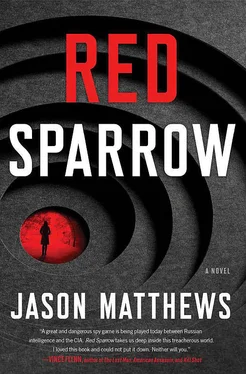What she did see was an Angel of Death. First she saw a reflected blur on the glass ceiling panels. The blur became a shadow gliding toward the bed, across each mirrored panel like poured black mercury, reflected a hundred times. Dominika felt a pulse of air as the apparition floated above Ustinov’s head. The gangster’s eyes were sightless with passion. He sensed nothing. A sprung steel wire flashed across Ustinov’s throat, drawing tight with a musical zing, cutting into his flesh. Ustinov’s eyes snapped open, and his hands scrabbled at the wire garrote now cutting into his windpipe. With his fingers digging at the wire, Ustinov’s face hung suspended inches from Dominika’s. Her mouth was frozen in a silent scream. He looked at her uncomprehendingly with red-rimmed eyes, a vein on his forehead bulging, his fingers trying for purchase on the wire. His mouth sagged open, a black thread of his saliva falling on her cheek. Ustinov’s body began convulsing. He shook side to side like a fish trying to throw a hook. Dominika registered that he was still inside her; she pushed at his chest, turned her head to avoid his spittle and blood, and tried to slip out from underneath him. But he was a big man, suddenly very heavy, and she couldn’t move. Dominika could only close her eyes, cross her arms across her face, and feel Dimitri Ustinov’s life ebb out of his body. She could feel blood, from the wire cutting his throat, dripping onto her neck and breasts. Ustinov was making a gurgling sound and started going limp, his breath bubbling through the blood, blue-black in this light, of his severed windpipe. Dominika felt a tremor pass through his body, his feet drummed on the bed quickly two or three times, and then he was still. The bed revolved in the pinky silence.
Nothing happened for another terrifying minute. Dominika opened one eye to see Ustinov’s face hanging above hers, eyes open, tongue visible in an open mouth. The indistinct black figure loomed over them both, unmoving, speckled by the pink dots. Were those black wings behind his shoulders, or just the reflection of the mirrors? The tableau of three motionless bodies revolved endlessly around the room. As if in a coordinated action, Ustinov slipped out of her and the black figure with a single movement dragged the body off her. It rolled off the bed onto the floor. The killer ignored the corpse, reaching over to the controls to stop the bed. Dominika made to get up, but the figure in black put his hand on her shoulder and pushed her gently back onto the bed. She was trembling, naked, and covered in blood. Her breasts were wetly black with it. The bedclothes were a tangle, but she gathered them up and tried wiping the gore off her body.
She would not look at the man, yet somehow knew he was not going to harm her. He stood at the foot of the bed, motionless, and Dominika stopped trying to sop up the blood and held the blood-black sheet in her hands. Her breath was ragged with fear and shock. The man was studying her foot, visible from beneath the sheet. He reached for her and she began to withdraw it, then out of some primal instinct kept it still. The man stroked the top of her foot lightly. Most people shake hands, but with Matorin, it was a little different.
=====
Formally, Sergey Matorin was an SVR staff officer with the rank of major assigned to the Executive Action Department (Department V). Informally, he was a chistilshchik, a “mechanic,” an executioner of the Russian secret service. In the KGB years, this department was known variously as the Thirteenth Department or Line F, or simply as mokroye delo, “wet work.” During the height of the Cold War, Line F had managed kidnappings, interrogations, and assassinations, but in the new SVR such things were said not to be even remotely contemplated or condoned. Granted, fractious Russian journalists were found shot in Moscow elevators, or regime critics succumbed to high concentrations of radionuclide polonium in their livers, but that had nothing to do with the modern Russian Foreign Intelligence Service. The age of the “umbrella pokers” had passed.
During the Soviet invasion of Afghanistan, Matorin served as a team commander in the elite Alpha Group of Spetsnaz, at that time under the command of the KGB. A screw came loose during Matorin’s five years in the valleys of Afghanistan, and the threads were permanently stripped. His eight-man team had followed orders, but Matorin didn’t much care about command. He was essentially a loner who liked to kill people.
He was hit during combat by a metal splinter that blinded his right eye, leaving it an opaque milky white. Tall, whip-thin, his face pocked and scarred, Matorin wore his gray hair plastered over a cadaverous skull. This and a sharp hook nose gave him the appearance of an undertaker. After the withdrawal from Afghanistan, on rare occasions he was seen in SVR headquarters ghosting through the offices of Department V. Younger officers stared in fascination at this throwback Polyphemus. Older employees turned away and crossed themselves.
Even though he was now deployed on occasional “special tasks,” Matorin missed the action of Afghanistan. He thought about it often. He had the ability to go back there in his mind, to see the sights, to hear the sounds, to smell the smells. Certain moments would spontaneously trigger his memories. These unexpected trips were the best, the most vivid, including the music. He could hear perfectly the staccato notes from the rubab and the crescendo beat from the tablas.
Matorin stroked Dominika’s foot just as he had stroked the foot of the pegged-out Afghan bint that one afternoon in the Panjshir Valley. His team had rigged a canopy over the blades of the Mi-24 helicopter and tied down the corners so there was a large shaded area for the men to sit. Earlier they had gunned a group of muj on the road, landed to collect booty, and found the girl hiding among the rocks by the roaring river.
She was about fifteen years old, dark hair, almond eyes, her clothes worn and dusty, the usual filthy camp follower. Every Soviet military man serving in Afghanistan had heard stories about what Afghan women did to Russians taken prisoner, so there was no love lost for the girl. She was straining with the cords around her wrists, but the double loop around her neck threatened to strangle her if she struggled too much. She swore and screamed and spat at the eight Alpha Group commandos who stood in a circle around her. Matorin squatted between her widespread legs, secured at the ankles, and watched her struggle. He reached out and held her sandy foot and caressed it. At the touch of the infidel the girl screamed and bellowed and called out to the hills, to her fellow fighters, to come to rescue her.
She needn’t have objected to someone simply touching her foot. There was more to come. In the next fifteen minutes Matorin had carefully sliced off her clothes with a short sheath knife and had unwrapped her hijab. She lay supine in the dust, under the canopy that billowed gently in the wind. A soldier poured water over her face, washing it clean, but she spat back at him, thrashing her body against the cords. Matorin reached behind his back and unsheathed a Khyber knife, two feet long, the edge of the elegantly curved, T-shaped blade bright silver from constant honing.
Lying flat behind a boulder a hundred meters up the rocky slope, an Afghan teenager put down his AK-47 and peeked around the rock. He could see the big mottled-green helicopter—he knew it only as “Shaitan Arba”—on the ground, its stationary rotors drooping with their own weight. He saw a circle of figures beneath the billowing canopy. Over the faint roar of the river and the wind in the rocks, the boy heard another sound from the valley floor: a shrill keening, a young woman’s screams, which went on and on. The boy uttered a prayer and slipped away. He knew there was something down there that was more terrifying than just infidel Russians.
Читать дальше












